Vietnam Moratorium Day was observed quietly in various parts of the Vineyard Wednesday - by children building peace symbols on the Menemsha sand; worshipers at a morning Eucharist service and an evening prayer service at Vineyard Haven’s Grace Episcopal Church; a solemn handful who listened to the names of Massachusetts’ war dead being read, high school students attentive to blues-rock music and a dozen who shivered after dark with candles in their hands outside the West Tisbury Congregational Church,
The largest of the day’s gatherings was at Menemsha, where, at 1 p.m. close to 200 moved to make a silent protest against the war began to assemble. Some stood with their friends and talked gently of war and peace; others stood alone, or sat on blankets on the sand, watching the silvery swirl of the tide under the midday sun, and the golden bluffs of the Elizabeth Islands looming over Vineyard Sound.
There were as many who were white-haired in attendance as there were of the young. A few preferring anonymity, sat in their cars by Menemsha Bight where catspaws dimpled the water and where, one onlooker said, even the ordinarily careening sea gulls overhead seemed solemnly silent. Young men in neat business suits, mothers in elegant pants suits, contractors in overalls and the long-haired and dungaree-clad, stood side by side.
Encouragement Expressed
Michael Kortchner, a bearded, blond 25 year old, who was a member of the Presidential hopeful Eugene McCarthy’s staff last year, paused by his motorcycle to express his encouragement at the number of people from all parts of the Island who had left jobs, closed stores, slipped out of school to do reverence to the Vietnam war dead and to pray for peace.
Mr. and Mrs. Arthur W. Young Jr. came from Edgartown with 12 year old David and 7 year old Connie, the youngsters who formed the peace symbol of stones on the beach. In Boston, the Youngs’ oldest child, Bill, a Boston University student, was taking part in a similar silent protest on the Boston Common. At the Northfield School for Girls, 16 year old Debby Young was attending the moratorium services, as was 14 year old Tony at the Marblewood School in Cornwall, Conn.
“It seemed important that all of us participate in one way or another,” Mr. Young said.
Eight students from the Regional High School deemed it important enough to express their disapproval of America’s war policy to cut classes - regardless of what the penalty might be - in order to join the others who felt as they did, at Menemsha.
Some arrived late, after circulating a door-to-door petition against the war. A telegram-petition begging for peace was passed, as well, among those on the sand, and has been sent to President Nixon.
The Rev. William O. Grunden of the Methodist parish, walked with his wife on Dutcher Dock, and talked a little of his thoughts. “Too much blood,” he said, “has been shed over nothing. The government should react, I believe, to this antiwar sentiment all over the country.”
Songs were sung for awhile at the beach - Let Us Bring Them Home, We Shall Overcome, Study War No More. A few words on the meaning of the moratorium were said by Charles Hamilton, an organizer of the gathering.
There were those who felt that more could and should have been done at Menemsha - who expressed disappointment that there was not a larger number of Vineyarders paying attention to the special day. Among these was the mother of a serviceman. She said sadly she guessed she had expected something more because her sentiments were so strong about getting her son and his comrades home again soon.
“It was kind of like a bad cocktail party with nothing to drink,” said another who was disgruntled that the turnout was not larger and the program not filled for two hours but those who met were on the who please be among others who felt as they did that war is a waste.
No Hecklers
As for hecklers, there were none. One young woman standing by her car admitted that she was on hand only to “see what was going on.”
“I don’t approve of any of this foolishness and I think it’s aggravating,” she said. “I think the government is doing all that it can.”
The high school students who came seemed both nervous and proud - proud that they were willing to risk penalties to take part in what they considered a worthwhile cause; nervous about the possible penalty. (None, turns out, will be imposed.) All of them left the Menemsha moratorium in time to return to the Regional High School’s special assembly, where the Rev. S. Read Chaterton, minister of Edgartown’s Federated Church, gave an invocation followed by a history of the war read by Sue Carroll, a view opposed to the moratorium expressed by Robert Sanger, readings of student anti-war poetry and of reflective pieces on the beauty of nature, and a speech against war.
Among those participating were John Athearn, Laurie Lyons, Robert Erickson, Alicia Lesnikowski, and Jeffrey D. Kelley, organizer of the school program. The Rev. Donald A. Couza of St. Elizabeth’s Parish offered the benediction. Frank Atkinson of West Tisbury concluded the assembly with selections on his guitar, and even though the school buses had already left, many remained to hear his mournful and hopeful ballads. Attendance at the school moratorium was optional.
Later in the afternoon, Grace Church held its special evening prayer service with prayers offered by the Rev. David E. Smith, director of the Youth Center, the Rev. Donald H. Lyons, church rector, and Mr. Grunden. The noontime reading of the names of war dead was done by David T. Hugo, Dr. Russell S. Hoxsie, Harold S. Johnson and Herbert G. Pond.
The last of the day’s service was at 10 p.m. before the gleaming, floodlighted tower of the West Tisbury Congregational Church where three prayers were said under the chill autumn sky. There was a crescent moon, specks of stars - stillness broken only by the crunch of leaves under feet. “Why,” one participant put it, “shouldn’t the whole world share this peace?”

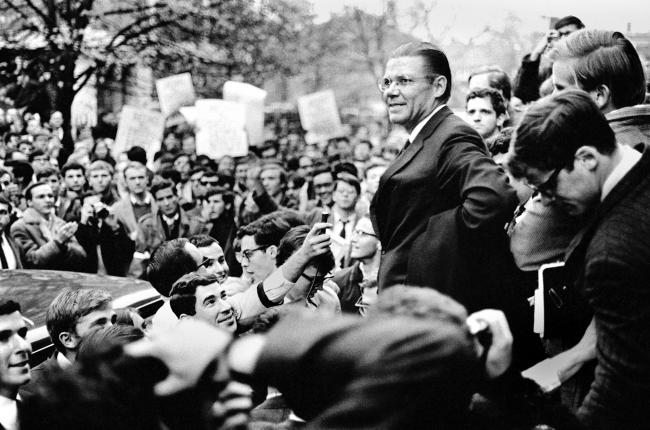
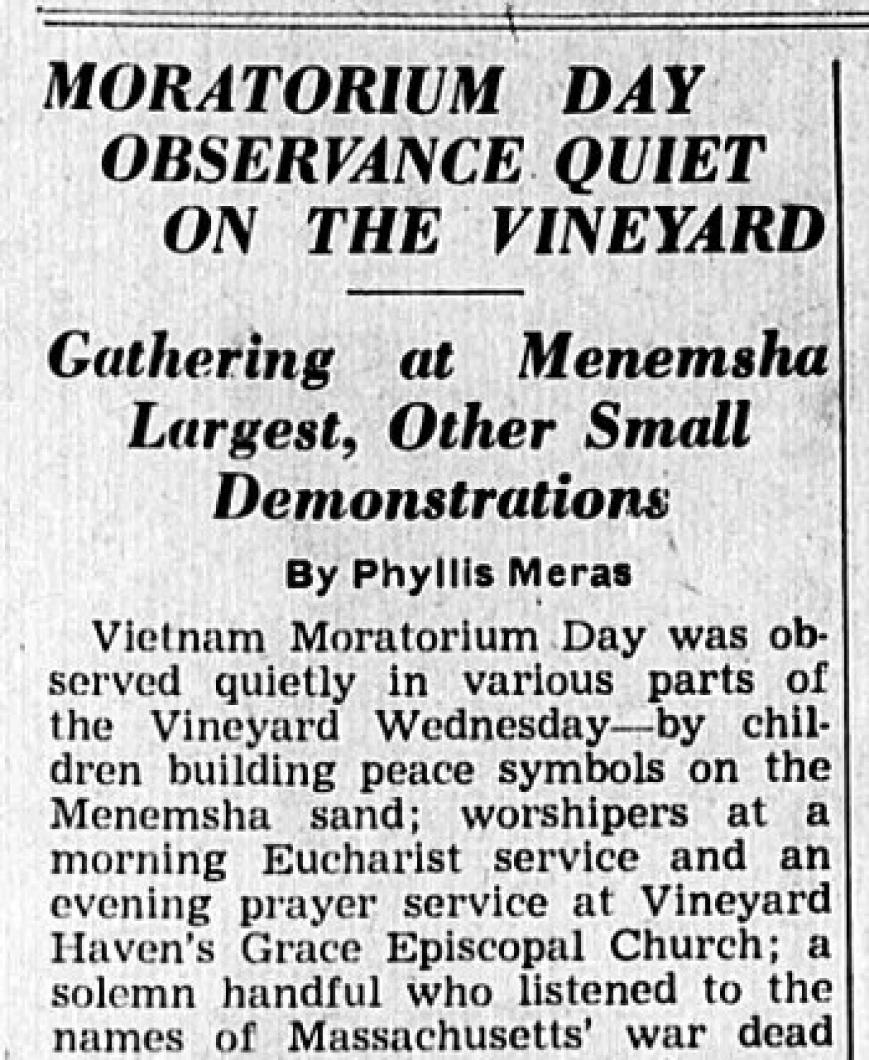



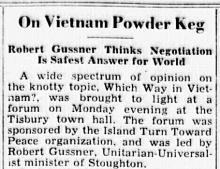
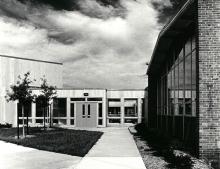
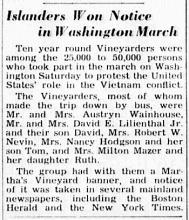

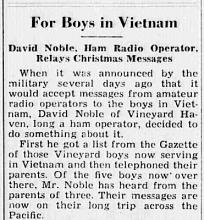
Comments